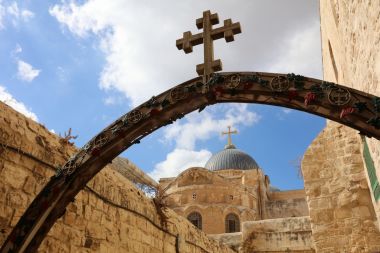The world needs more peacemakers, not peacekeepers

I spend most of my days praying for peace. As I watch millions of mothers and children fleeing Ukraine to an uncertain future, and here in the Holy Land where I advocate and work for peace, it would be remiss of me not to.
Although freedom of religion is promoted in the Holy Land, the reality is that the minority Christian population experience less and less freedoms; properties owned by Christians are illegally squatted by radicals and they are evicted from their homes.
When recalling Jesus' words of the Sermon on the Mount, I am continually surprised that many quote Jesus' words as "blessed are the peacekeepers." Instead, Jesus' words across Biblical translations actually mean "blessed are the peacemakers."
In these times when peace so often seems to elude us, the distinction between 'peacekeepers' and 'peacemakers' has become increasingly vital.
During my many visits to the Holy Land, I have concluded that peacekeeping can be the opposite of peacemaking. In these current fragile times, we need fewer peacekeepers and more peacemakers. The ambition of peacekeepers is to keep the peace - at all costs. As a result, they can often avoid the discomfort needed to solve issues at the core and instead focus on maintaining the status quo.
Quite frankly, the status quo of our world needs to be broken, and 'keeping the peace' isn't enough.
Taken to its extreme, 'keeping the peace' would have meant allowing slave owners to continue to own slaves; 'keeping the peace' would have meant not allowing women to vote; 'keeping the peace' would enable countries to invade others as long as it doesn't impact petrol prices too much. 'Keeping the peace' means that we would allow the Christian communities in Jerusalem to continue to be persecuted to the literal point of extinction.
Peacemakers, on the other hand, can be disruptors. They recognise that sometimes, they need to disrupt the status quo to allow real peace to prevail. Peacemakers actively build peace; they speak up when it's uncomfortable and step in where injustice has taken a foothold.
I have personally witnessed a community of Christians in Palestine enduring oppression, misery and humiliation. I have seen a Christian community once thriving, now so reduced in number that the idea of no Christians existing in the very birthplace of Christ is a reality.
How sad that in the birthplace of Jesus, His followers are no longer welcome!
It's not lost on me the tragic irony that the very place where Jesus turned over the tables is now the very place where we, as Christians in the West, need to flip the proverbial tables over to disturb the peace of injustice that is occurring to the Christian communities in Jerusalem.
In the same way that Jesus didn't express tolerance on that day in the temple, neither should we be tolerant of the mistreatment of our brothers and sisters in the very place that Jesus walked.
Perhaps the best example I can think of when it comes to peacemakers, aside from Jesus, are His disciples. Being a 'peacekeeper' would have meant never uttering Jesus' name ever again; the political and religious leaders of their day would have preferred the peace be kept by forgetting that Jesus existed.
But they didn't walk that path; they 'disturbed the peace' by becoming 'peacemakers' - by sharing His peace with the world; creating a transcendent and perfect peace by spreading Jesus' message. Without this, we wouldn't know Jesus' name today.
When done Jesus' way, peace can literally be the opposite of safety.
Like many people, I have been saddened to see the dramatic reduction in church attendance in the West, especially with younger generations deciding that church is not for them. I can't help but wonder whether 'peacekeepers' have been part of what has held churches back, keeping the peace by stifling the Church from challenging the status quo and protecting power structures that keep out rather than welcoming in.
I can't help but wonder whether we need to disturb the peace much more so that we can create a greater sense of peace in our churches. This includes looking globally to understand where more peace needs to be built.
Peacemakers are urgently needed in Ukraine, peacemakers are urgently needed in our local churches, and peacemakers are urgently needed in the Holy Land, the very place where Jesus first uttered those words of peace.
Anita Delhaas is CEO of the International Community of the Holy Sepulchre (ICoHS).











